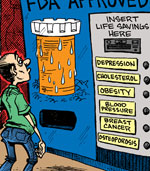How the Vitamin E Succinate Structure Creates a Superior Nutritional Supplement
| Share on Facebook | Share on Twitter | Share on Google+ |
The form of vitamin E we know best is alpha-tocopherol. As the ending -ol hints, alpha-tocopherol is an alcohol.
It's easy for an alcohol to evaporate out of a container, and it's hard to keep an alcohol from combining with other compounds, even the lining of the bottle it's kept in, that change its nutritional benefits. Changing alpha-tocopherol into d-alpha-tocopheryl-succinate protects its antioxidant potency and greatly extends its shelf-life. Here's why.
The alpha-tocopherol, beta-tocopherol, and gamma-tocopherol forms of vitamin E are the forms found in fresh food. As long as the foods hasn't gone bad, these alcohol forms of the vitamin can go right to work providing antioxidants to keep various chemical reactions inside the body in balance. But as you probably know, you can't keep the foods that are especially high in these forms of vitamin E, like leafy greens and egg yolks, fresh and nutritious for more than a few days to a few weeks, even with refrigeration. These forms of vitamin E have to be transformed to keep them stable.
Alpha-tocopherol, beta-tocopherol, and gamma-tocopherol can be combined with acetic (vinegar), succinic (sugar), nicotinic (vitamin B), or linoleic (healthy plant oil) acids to make various esters, which are nothing more than the chemical combination of an alcohol and an acid. Different esters have different applications.
Acetate and succinate esters are used in making vitamin capsules. (Some manufacturers of skin care products use the acetate form of vitamin E, but this is not the kind of vitamin E you skin needs.)
Nicotinate and linoleate esters are used for making face creams. The most stable form of vitamin E for vitamin E capsules is the succinate ester. The ester form keeps the vitamin from combining with oxygen that gets into the capsule and keeps it fresh. But it also slows down the rate at which your body can use the vitamin E.
Acetate esters of vitamin E are more easily absorbed by your body. They also go bad in the bottle. Succinate esters of vitamin E take a little longer to build up in your body, but they stay fresh in the supplement jar for years at a time.
And a form of vitamin E known as d-alpha-tocopheryl polyethylene glycol 1000 succinate is a form of vitamin E that acts like a healthy fat, gathering up various antioxidants and other vitamins and keeping them in your bloodstream. But it's enough to know that the reason you need a succinate form of vitamin E is that it will stay good on the shelf for a very, very long time, far longer than other forms of the vitamin.
Dr. Kimberley Kline of the University of Texas at Austin and Dr. Kedar Prasad of the University of Colorado believe that the succinate form of vitamin E is somehow especially fast to be absorbed by cancer cells. This is especially true of breast cancer cells. Neither the alpha tocopherol part of the molecule nor the succinate part of the molecule has any effect on cancer cells on its own.
It is an overstatement to say that when cancer cells are treated with vitamin E succinate, tumor dormancy results. But both experts recommend taking vitamin E to prevent cancer and Dr. Prasad also recommends vitamin E for cancer treatment.
If you choose to take radiation therapy for your cancer, however, ask your doctor about taking vitamin E. You don't want to invigorate your cancer cells, protecting them against radiation, at the same time you are taking a radiation treatment!
-
Skin CareMen Skin Care
-
Free ResourcesFree eBooks
-
The physician should not treat the disease but the patient who is suffering from it.Maimonides
-
Featured Health Supplement
 If you find a product that is as effective as Total Balance, and is better value for money, let us know and we will give you a refund equivalent to your entire purchases of Total Balance…retrospective.
If you find a product that is as effective as Total Balance, and is better value for money, let us know and we will give you a refund equivalent to your entire purchases of Total Balance…retrospective.
-



















